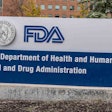
At least one pathologist has said it was wrong for scientists representing Liverpool Clinical Laboratories to insist insulin poisoning was the only explanation in a series of high-profile newborn deaths in the U.K., The Telegraph reported.
Since the conviction of neonatal nurse Lucy Letby following two trials, the former head of an NHS pathology laboratory has said that at least one in every 200 immunoassay tests is wrong, adding that the figure could be closer to one in every 100 or higher, according to The Telegraph's October 18 case update. Immunoassay test results were incorporated into medical evidence in the Letby case, along with x-rays and other key pieces of evidence.
“Of all the technologies we use in the lab for measurements, the one with the highest error rate is the immunoassay and this is usually due to interference in an individual sample," Dr. Adel Ismail said in connection with the case. "A patient's blood can contain antibodies with 10 billion different permutations that by sheer chance can interact with the test, causing falsely high or falsely low results and these results can be extreme."
Laboratory readings showed abnormally high levels of insulin but low levels of c-peptide which should be present at a significantly higher level than the hormone when insulin is naturally produced by the body, The Telegraph noted.
The prosecution portrayed Letby as a serial killer, "killer nurse," and "Nurse Death," according to press accounts.
"This was one of the longest trials in English criminal history," BBC correspondent Stephanie Hegarty explained for NPR's All Things Considered today. "It went on for 10 months, and she was eventually convicted on 15 separate charges for seven murders and eight attempted murders. And there was a huge amount of evidence ... the prosecution's case was that Letby was the only nurse who was always there when babies collapsed and some of them then died, when it was unexplained or unexpected."
It was a circumstantial case, Hegarty's BBC podcast from October 1 explained in more detail. Medical evidence was reviewed by a team of medical experts, including pediatricians, radiologists, and a pathologist. Letby received 15 whole-life sentences following her conviction.
However, as Hegarty explained in her podcast, more questions are being raised about the laboratory test results used as medical evidence in Letby's case. In addition, the lack of expert witnesses for the defense raises concerns for one of Britain's most senior pathologists, who participated in Hegarty's podcast but did not want to be identified.
"The way that the pathology was presented, that was not convincing to me as a pathologist," the pathologist said. Furthermore, the lab tests should have been verified before using them in court, added Ismail in the podcast.
Hegarty's research found a spike in infant mortality in Britain around 2015. Issues at Countess of Chester Hospital created a picture of a unit that wasn't operating at its best. The hospital's "risk register" revealed more, according to Hegarty's podcast, including understaffing and under-skilled personnel, even a bacterial outbreak of pseudomonas.
Since Letby’s conviction, many scientists, doctors, nurses, and statisticians have come forward to question the evidence presented to the jury and have also queried statements made at the inquiry, The Telegraph said today. Letby's legal advisor Mark McDonald is asking for the Criminal Cases Review Commission to review the trial.
Read The Telegraph's October 18 report here.



















